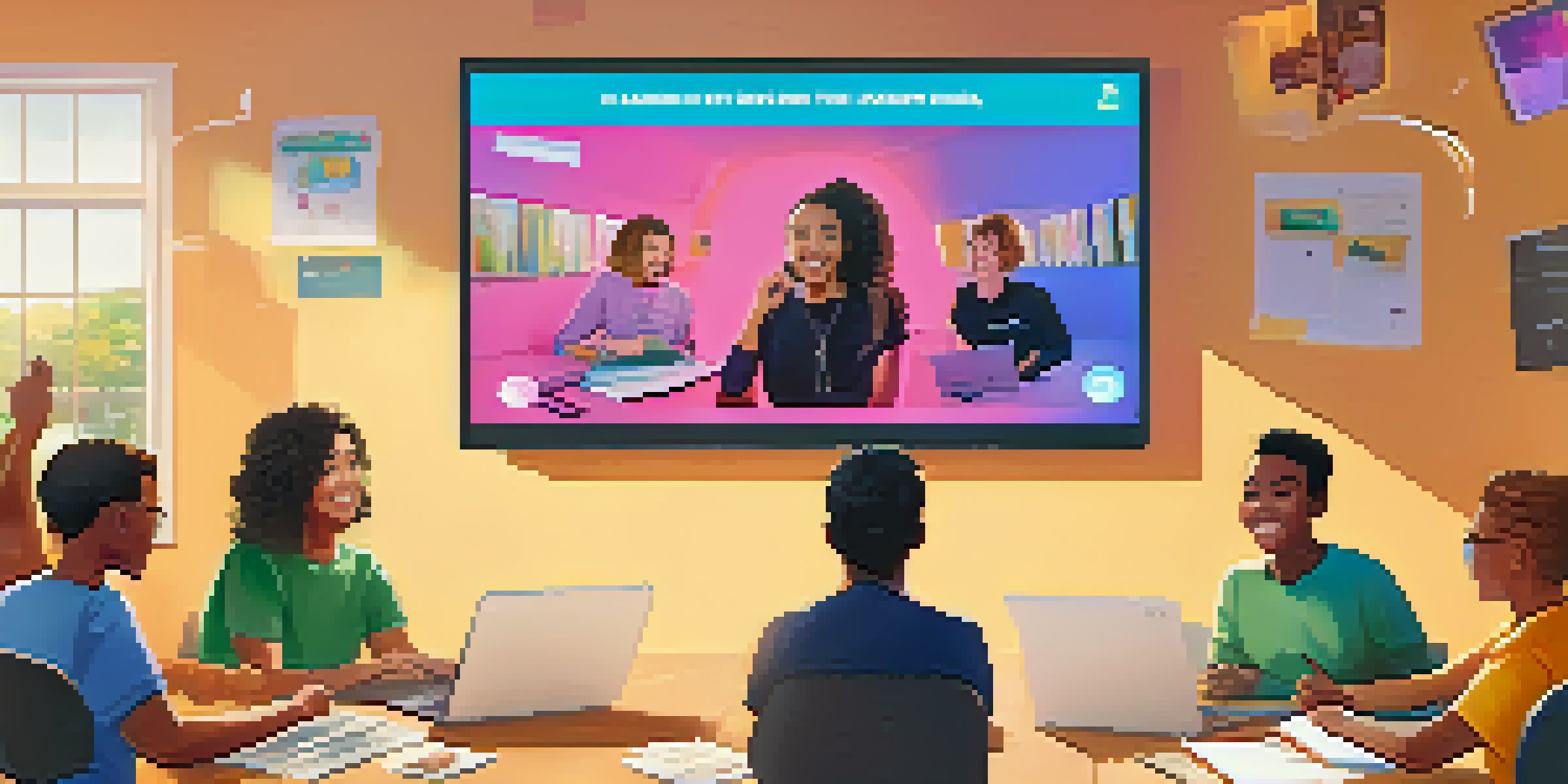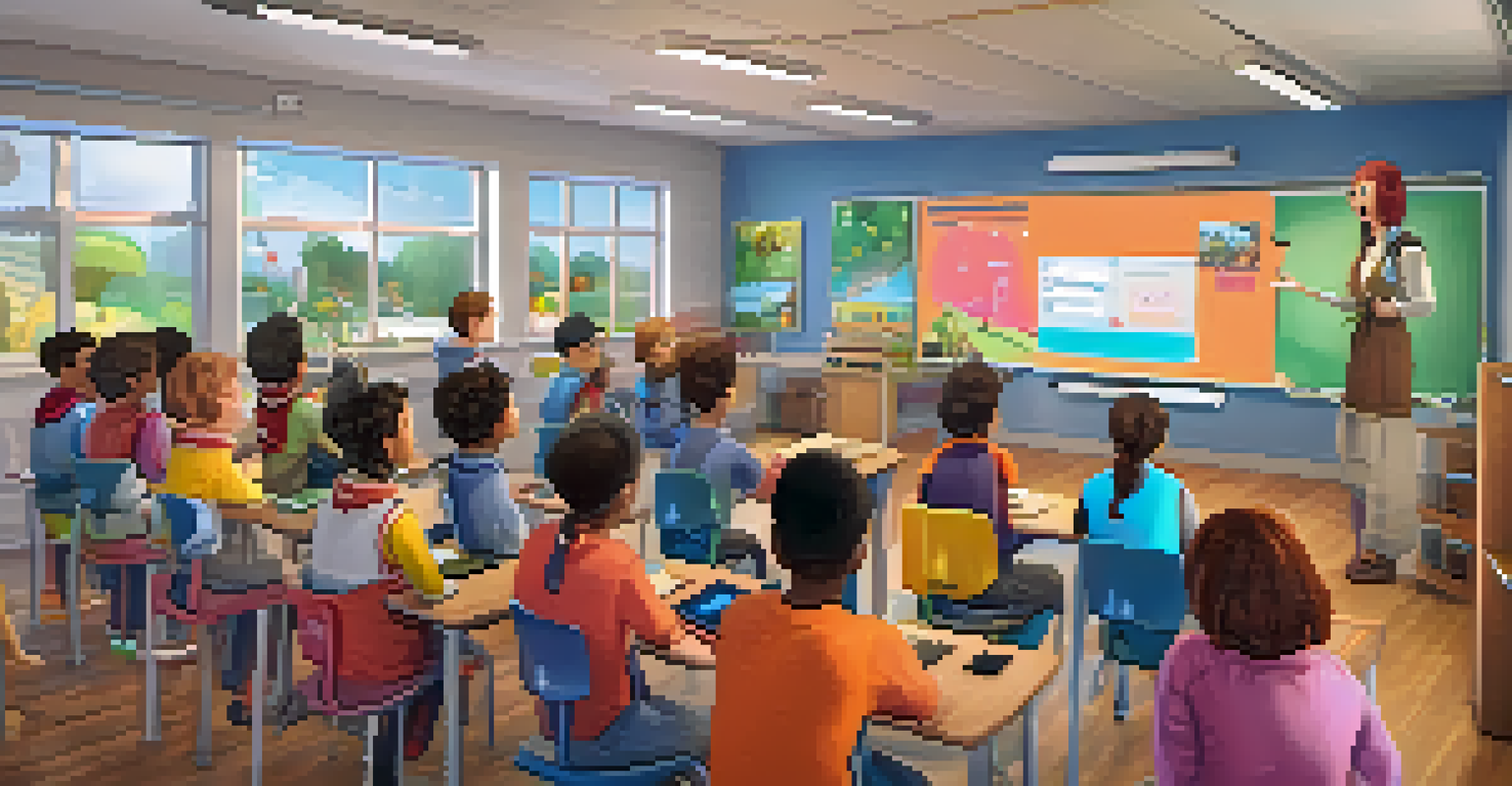Exploring the Role of Humor in Online Learning Environments

Understanding Humor's Impact on Learning
Humor has a unique ability to break down barriers and create a more relaxed atmosphere in educational settings. In online learning, where the absence of physical presence can lead to disengagement, humor acts as a bridge to connect students and instructors. This connection fosters a sense of community, making learners feel more comfortable and open to participating.
Humor is mankind's greatest blessing.
When humor is incorporated into lessons, it can make complex subjects more digestible. For instance, a math problem presented with a humorous twist can transform a daunting task into an enjoyable challenge. This playful approach not only captures attention but also aids in memory retention, as people tend to remember funny moments far better than dry facts.
Ultimately, leveraging humor in online learning creates a positive feedback loop: the more engaged students feel, the more likely they are to participate. This increased interaction enhances the learning experience, leading to better academic outcomes and a more enjoyable educational journey.
Building a Sense of Community Through Humor
In the world of online education, creating a sense of community can be challenging. Humor serves as a powerful tool to bridge the gap between students and instructors, fostering connections that might otherwise be difficult to establish. When instructors share light-hearted anecdotes or jokes, they humanize themselves, making them more relatable and approachable.

For instance, consider a virtual classroom where the instructor shares a funny story about their own learning experiences. This not only lightens the mood but encourages students to share their own stories, promoting interaction and camaraderie. Such exchanges can transform a solitary learning experience into a shared journey filled with laughter and support.
Humor Boosts Online Learning Engagement
Incorporating humor into lessons helps to capture students' attention and makes learning more enjoyable.
Moreover, humor can help diffuse tension during stressful periods, such as exam weeks. By incorporating playful elements into discussions, both instructors and students can alleviate anxiety, making the learning environment feel more relaxed and supportive.
Enhancing Engagement with Humor Techniques
Engagement is crucial in online learning, where distractions abound. Humor can be strategically integrated into lessons to capture and maintain students' attention. Techniques such as funny quizzes, humorous videos, or playful discussions can make the learning process feel less like a chore and more like a fun activity.
Laughter is the shortest distance between two people.
For example, an instructor might use a meme relevant to the course material to spark a discussion. This not only draws students in but also encourages them to think critically about the subject matter in a light-hearted way. The blend of humor and education can create memorable moments that resonate with students long after the class ends.
Additionally, humor can encourage participation. When students feel that the environment is enjoyable and non-threatening, they are more likely to share their thoughts and engage in discussions, leading to a richer learning experience.
The Role of Humor in Reducing Anxiety
Anxiety can significantly hinder learning, especially in online environments where students may feel isolated. Humor plays a vital role in alleviating this anxiety, creating a more relaxed atmosphere for everyone involved. When humor is present, it lessens the fear of making mistakes, allowing students to take risks in their learning.
Imagine a student attending an online presentation filled with humor and light-hearted moments. Instead of fearing judgment, they feel encouraged to express themselves and engage more openly. This shift in mindset can lead to greater participation and a willingness to explore new ideas.
Building Community with Laughter
Humor fosters connections between students and instructors, creating a supportive online learning environment.
Furthermore, humor acts as a reminder that learning can be fun. By infusing joy into the process, students are more likely to embrace challenges rather than shy away from them, fostering a growth mindset that is essential for lifelong learning.
Incorporating Humor in Course Design
When designing online courses, considering humor can enhance the overall experience. Instructors can integrate funny anecdotes, relatable memes, or amusing quizzes into their lesson plans to create a dynamic learning environment. This thoughtful inclusion encourages students to look forward to classes rather than view them as a mere obligation.
For instance, an instructor might create a course module that features humorous video clips related to the subject. This approach not only captures attention but also reinforces key concepts in an entertaining way. By weaving humor throughout the curriculum, instructors can make learning feel less intimidating and more enjoyable.
Additionally, course design can benefit from feedback on humor effectiveness. Instructors can gauge student responses and adjust their use of humor accordingly, ensuring that it resonates well with the target audience.
Balancing Humor with Educational Goals
While humor is valuable, it’s essential to strike a balance between being funny and fulfilling educational objectives. Excessive humor can detract from the main topics, leading to confusion and distraction. Therefore, instructors should aim for a harmonious blend where humor enhances rather than overshadows learning.
A well-placed joke or a humorous example can illuminate complex concepts, making them easier for students to grasp. However, having too many comedic elements in one lesson might result in losing sight of essential information. A thoughtful approach ensures that humor supports the educational goals while still keeping the atmosphere lively.
Reducing Anxiety Through Humor
Using humor in education alleviates anxiety, encouraging students to participate and embrace challenges.
Ultimately, the key is moderation. By carefully selecting when and how to use humor, instructors can create an engaging environment that fosters learning without compromising the integrity of the content.
The Future of Humor in Online Learning
As online learning continues to evolve, the role of humor is likely to expand even further. With advancements in technology, such as virtual reality and interactive platforms, there are endless possibilities for integrating humor into educational experiences. These innovations can make learning feel more immersive and enjoyable, encouraging students to actively participate.
For instance, imagine a virtual classroom where instructors can use animated characters to deliver content in a humorous way. This kind of engagement not only keeps students entertained but also motivates them to delve deeper into the subject matter. The potential for creativity and fun in online education is boundless.

In conclusion, humor will remain an essential element of online learning, enriching the experience for both students and instructors alike. As we embrace the future of education, let’s continue to explore innovative ways to make learning enjoyable and engaging through the power of laughter.